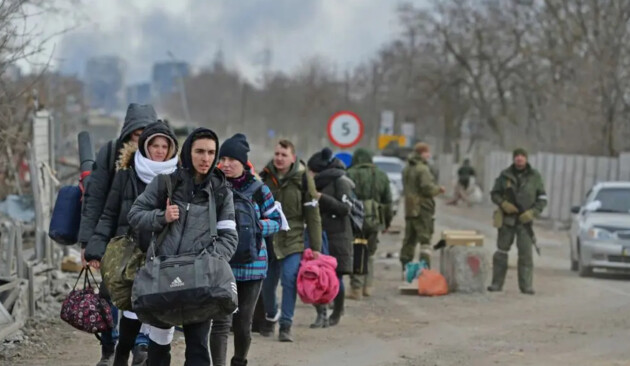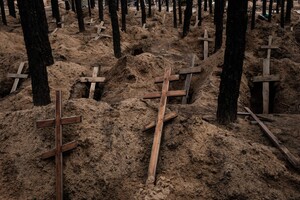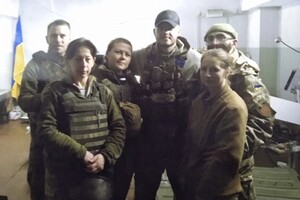Deportation under the guise of evacuation

When one hears the word "deportation", it is possible to immediately imagine a large number of people who are forced by the military to climb into a freight car, and then these cars take them to a foreign land, sometimes thousands of kilometers from home.
However, during the occupation of Ukrainian settlements after February 24, 2022, the Russians act a little differently, namely, they call the actual deportation evacuation. They deceive by saying that it is "only for three days" and intimidate - "the Armed Forces of Ukraine will come and shoot you all." In addition, the Russian military is shooting at houses and making life unbearable for local residents. Thereby forcing people to get on an "evacuation" bus themselves or get into their own car and drive. Although it is possible for people to "evacuate" only to Russia or Belarus, the way to the territory controlled by Ukraine is blocked.
This is exactly what happened in the occupied settlements of Kharkiv region. The ZMINA Human Rights Center was told about this by local residents.
Only for three days
Ruska Lozova is a village of the Dergachiv community, five kilometers from Kharkiv. It was under occupation from the first day until May.
As of February 24, 2022, people have not been able to leave the village for Kharkiv. "I woke up in the morning and heard shooting. At first, I thought that the neighbors were setting off fireworks. I approached the window, and everything was on fire there. My granddaughter was living opposite, in a village called Lisne. I already thought that their village was on fire," recalls local resident Lyubov.
The granddaughter of a woman from the village of Lisne was able to leave for Kharkiv, but no one was allowed to leave Ruska Lozova.
"The Russian military said that it is necessary to leave only for three days. Why exactly for three days is unknown," the woman says.
At the same time, the shelling began, many houses were burned. People were very scared, especially those with children, so many left. They were taken out by buses, and some drove by car.
However, local residents were not able to return after three days, but only after the deoccupation of the village.
"Evacuation" under shelling and propaganda cameras
The village of Tsyrkuny is also located a few kilometers from Kharkiv. The village was under occupation for two and a half months. It was without light, without communication, but with daily shelling and intimidation. Residents could not leave for territories controlled by the Ukrainian government either.
Those who had no basements or whose houses were broken into found shelter in the church.
"A large dining hall was equipped in the basement, and the priest's house also had a basement. That's why we spent the night there," says Natalia, a local resident whose house was hit by a shell.
According to her, there were many people in the church, up to 60. All people had to sleep where they could find a place, namely on the floor or on chairs. "However, the residents could sleep there, but they could not at their homes due to constant shelling," the woman recalls.
Every day the "commandant" came to the basement, told the news and insisted on going to Russia. The Russian military also came and persistently offered to leave, but only to the Russian Federation.
At the beginning of March, during another "evacuation" with the Russian military, there were also propaganda media. When the local residents, who decided to leave anyway, came out of the basement, the shelling began. The shell hit the two-story houses near the church.
"People got scared, ran back to the basement, and the military in this commotion shouted 'Run, run,' and people ran into buses, some ran to their cars. People were transported like cattle, in a standing position," recalls Natalia, whose daughter-in-law was leaving with her grandchildren at that time.
The Russian military "ran from house to house and shouted that the Ukrainians were advancing and the village would be destroyed"
The border with the Russian Federation is only seven kilometers away from the village of Vesele in the Lipetsk community. At 5 AM on February 24, the residents of Vesele were awakened by the cannonade of the first "Grads", the shelling of the village began.
People could not go to the territories controlled by Ukraine until September, when Kharkiv region was liberated by the Ukrainian army. It was possible to leave the village only in one direction – towards Russia.
The Russians and their local helpers went from house to house, offering "evacuation". "They told people to go to the Russian Federation, promising housing, food and help," says Oleksiy Slabchenko, head of the Lipetsk village council.
It is worth noting that in order to leave, people had to go to the commandant's office, write a statement and wait for the bus to arrive. During March-April, the bus came once a week, and then residents could leave only with their own transport. However, the people themselves were not allowed to leave, in order to leave they had to be accompanied by Russians. "They were escorted to Shebekino through Strylecha, through Vovchansk," says Slabchenko. In addition, he further recalls: "Somewhere on May 5, Russian soldiers and collaborators ran from house to house and shouted for people to leave, because the Ukrainians are advancing, there will be shelling and the village will be destroyed."
However, there was no shelling from the Armed Forces of Ukraine. On the contrary, according to the head of the village council, the Russians left their settlement in the direction of the village of Neskuchne and brought 16 tanks and self-propelled guns to a forest plantation.
"That is, they expected that the soldiers of the Armed Forces of Ukraine would enter, and they wanted to destroy the village themselves. However, after a day or two, the Ukrainians did not come, then they returned and stood at the edge of the village," says the head of the village council.
After the intimidation on May 5, many local residents left for Russia. Then the Russians started periodically shooting at the village, forcing those who stayed there to also go to the aggressor country.
After the de-occupation, residents gradually began to return to the village.
"It seemed that they were coming out in a column and used our residents as a cover."
For 200 days, Kozacha Lopan, a village of the Dergachi community, was under occupation. It is only 2 km away from the Russian Federation.
According to the head of the village Lyudmyla Vakulenko, the Russians all the time allowed people to leave only for Russia: "Only at the beginning was it possible to leave through Zolochiv district. However, a lot of people were blown up there because it was mined. Only from our village, three cars were blown up."
It is worth adding that on the night before the deoccupation, the Russians began to collect people from their homes.
"Even on the 10th (of September - O.L.) residents did not understand anything — because there was no communication and they did not hear shots. At half past midnight, already on the 11th, the Russian military knocked on people’s doors and said to get dressed quickly, the evacuation has begun, because the Ukrainians are coming to them and will sweep everything off the face of the earth," recalls the head of the village council.
Many people were woken up by the Russian military that night, and many left. Some, according to the locals, were taken away by the Russians on military equipment.
"I met a couple at the train station in Belgorod, they were from Strelecha — a man and a woman, they said they had been taken out by an armored personnel carrier," said Kozacha Lopan resident Valentyna Bilohrud, who was woken up by the Russians at night and taken to Russia.
According to the village head, it seemed that they were coming out in a column and used our residents as a cover.
However, since the buses left in the dark, the villagers could not see whether Russian military equipment was really accompanying their convoy.
Long way home
In Russia, residents of Kharkiv region who did not have relatives were distributed by region to boarding schools or boarding houses. "I know of cases when people were taken to Kursk region, and then to Ryazan," says Slabchenko.
In order not to end up in boarding schools, Ukrainians agreed in advance with their relatives in Russia, took their addresses and phone numbers, because at the border Russians could call their relatives and arrange a check.
Some people stayed with relatives. For example, Valentyna from Kozacha Lopan went to her sister in Tver and stayed there for some time.
"It took me two months to return home. There was no money, so my sister — she knows how to work with the Internet — found volunteers. They took us out of Russia to Belarus and then to Ukraine. It was free of charge, and they also provided water and food," the woman said.
Some, after crossing the Russian border, tried to leave Russia immediately and go to the Baltic countries. Some stayed there, while others, such as Serhiy Kryvetchenko, a resident of Liptsi, drove on.
"My wife is from Murmansk, so we made an agreement with her uncle, as if we were going to his place. However, after the inspection, we immediately went to the border with Latvia. Then to Germany," says the man, who was able to return home to his native village only six months later.
However, some of the Ukrainians who had to leave are still abroad.
Onysia Sinyuk, a legal analyst at the ZMINA Center for Human Rights, believes that all these circumstances — intimidation, lies, shelling — testify not to evacuation, but to deportation.
"The fact of the resettlement of civilians is obvious, so the question is only about the element of coercion. The existence of such coercion must be determined through a set of facts. Did people have an opportunity to freely choose the direction where to leave? Limiting or banning travel to the territory under the control of the government of Ukraine indicates a restriction of free choice," says the expert.
The extent to which this choice is free is also influenced by the reporting of false information (that it is temporary, "only for three days") and the restriction of access to alternative sources of information (there was almost no communication).
"The second fact: what was the reason for the decision to leave the territory of residence? Intimidation of persons by verbal threats of attack, shelling, and shelling itself, which creates conditions impossible to live in this territory, are all elements of coercion that leave people with no choice but to leave the territory of residence, fearing for their lives. All these circumstances testify to the presence of signs of the crime of deportation," Onysia Sinyuk continues.
According to Protocol No. 4 of the European Convention on the Protection of Human Rights, no one may be deported from the territory of the state of which he is a citizen. In addition, according to Article 7 of the Rome Statute of the International Criminal Court, "deportation or forcible transfer of population" are crimes against humanity and are subject to international criminal responsibility.
***
ZMINA, together with Ukrainian and international partners, documents cases of forced deportations to the territory of the Russian Federation and Belarus, committed during the Russian armed aggression against Ukraine.
If you have become a victim or a witness of forced deportation to the territory of the Russian Federation or Belarus, leave information about yourself in the online form or write to the e-mail address iy@humanrights.org.ua.
With the consent of the applicant, the received information will be used for appeals to national and international investigative bodies, in particular to the UN Independent International Commission for Investigation of Events in Ukraine, the International Criminal Court, etc., to investigate war crimes committed in Ukraine.
Please select it with the mouse and press Ctrl+Enter or Submit a bug




















 Login with Google
Login with Google